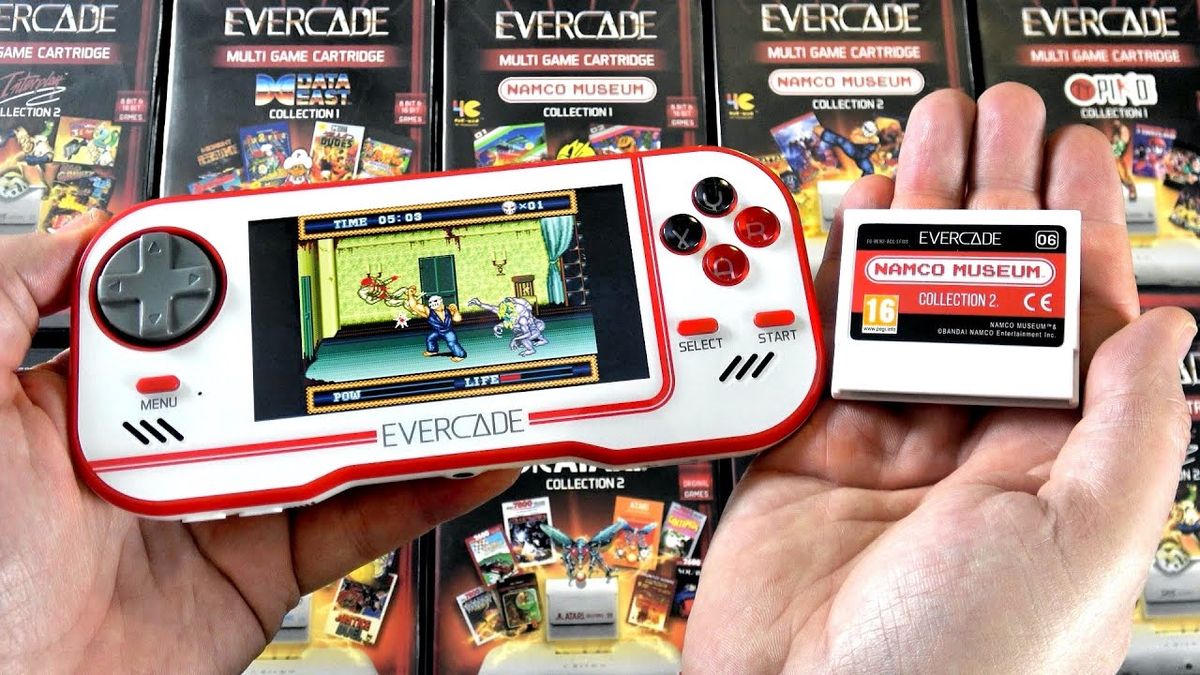GamesRadar+ Verdict
Despite some odd button-mapping choices and some filler games on the sold-separately cartridges, the Evercade is handheld heaven for older gamers wanting to revisit some classic games. Curious newcomers interested in gaming's earlier days might enjoy checking out the curated selection too.
Pros
- +
Officially licensed
- +
Has some stone cold classics
- +
Sturdy and comfortable in the hand
Cons
- -
Multiple extra purchases required
- -
Games collections are a mixed bag
- -
Button mapping is all over the place
Why you can trust GamesRadar+
While the Nintendo Switch might be the world's dominant handheld console, if you're looking for a much more retro gaming experience, then the Evercade by Blaze Entertainment offers a unique experience. So if you're looking for a nostalgic blast or are keen to see why so many modern indie games are trying to imitate the bygone era then this window into the past is well worth peering through.
The Evercade is a new, handheld gaming console featuring a huge range of officially licensed retro games from the 8-bit and 16-bit eras. It's not just the handheld nature that makes it stand out from the retro reimaginings like the for-your-TV-only SNES Mini, Sega Genesis Mini (or Mega-Drive Mini to our UK readers), PlayStation Classicor any of the other highlights on our picks of the best retro game consoles. No, and this is the fun hook for retro gamer fans, it comes with physical game cartridges.
We're not talking single carts for individual games. That would be a bit much. Instead, we have collections from a range of past publisher faves. Prolific ones like Atari, Namco and Interplay all have two boxed releases and you'll find more collections from the likes of Data East, Technos, and even new studios who specialize in retro games like Mega Cat.
The cartridges come loaded with up to 20 games and cost around $20/£15, with the Evercade console and the first Namco Museum Collection as a bundle starting at around $80/£60. A larger bundle with three cartridges will set you back around $99/£79. So depending on what games you fancy reliving (or, indeed, discovering for the first time), it's not hard to see this getting a bit pricey, fast. But perhaps, the Evercade is worth the investment? Let's take a look.
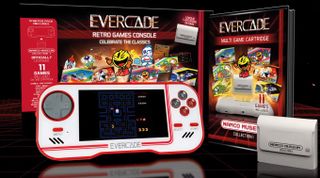
The Evercade - handheld design
If you want to compare the design to a more recent handled, the PSP is a decent place to start. There are no analogs, but there's a similar-sized 720p 4.3-inch screen and there's certainly a bit of heft to the console, but in a good way and the rounded corners allow it to sit naturally in your hands.
Rather than yet another black chassis though, the Evercade turns on the style with a white body with red trim. It's certainly more attractive than the Atari Lynx or Sega Game Gear ever were. It's somehow retro, and yet unlike any other handheld all at once. We love it.
As for the layout, we've got four face buttons that match the Xbox layout for X, Y, A, and B - a strange choice given many of the Evercade's games originally appeared on Nintendo systems. But they're responsive enough with just the right amount of pushable depth. The single Left/Right shoulder buttons are more like mouse clickers though, but in all fairness barely any of the games use them. As for the eight-directional d-pad, there's quite a lot of wobble to its solitary piece of plastic - to be fair, even modern consoles continue to balls up the d-pad. As far as control inputs go, that's your lot, no analog sticks, but that's no surprise given the age of the games and the fact the games seem to be intact with no changes made to their code beyond getting them physically running on new hardware.
Volume control buttons sit on the underside, nicely out of the way. There's a 3.5mm headphone jack underneath too in the center just next to the Micro-USB charging point (you'll get 4-5 hours of play between charges). Topside, you have a mini-HDMI port for hooking the handheld up to your TV - more on that later.
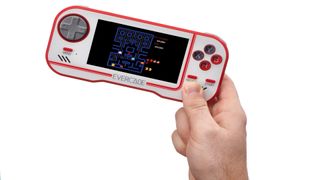
How does the Evercade perform?
It's a pleasure to say that games run beautifully on the Evercade. On a lot of poorly optimized emulators out there, we often see retro titles suffer with shimmering or ghosting, especially on TVs. But the Evercade's display and emulation technology sync up wonderfully for the most part, with Titan being one of the few titles obviously suffering when scrolling up and down the playing area at speed - but not enough to stop it sinking its hooks in me thanks to its improvement on the Breakout-style of ball pinging. I had a few crashes, but that's basically a stable of retro gaming, so you know, give them a break.
Games run in the traditional 4:3 ratio like older TVs, but you can quickly dash into the system menu at any time to switch it over to a stretched 16:9 ratio if you want to use the Evercade's screen to full effect. I'm certainly not a purist and generally can't abide unused space on a screen, but I generally stuck with the original ratio to preserve the game's intended visuals.
As expected with retro games, many are excruciatingly difficult and unforgiving. So I'm a big fan of being able to save and load from absolutely anywhere, which makes some of the games much easier. You're still left with the same limited number of lives and continues as the original version, but you can give yourself a bit more of a fighting chance and avoid retro ragequits as much. Well, a little, a lot of these games will still reduce you to tears. Jumping over that river (well, a small stream) in Splatterhouse 2 is still teeth-gnashingly difficult thanks to Rick's lead-lined jumping skills and off-screen baddies sucker-punching you straight back into it.
Generally, the games perform as you might remember them, but any games emulated from the Mega-Drive run into an issue thanks to the layout of the face buttons not really syncing up with the old-school ABC buttons. It's particularly annoying given the in-game options often show a Mega Drive controller on the screen, basically sending you in blind.
Having to press Y to jump in some platformers is all sorts of off too. What I would have really liked to see the Evercade do via its always-available system menu (it exists separate to the older original games' menus) is some sort of controller mapping. There's no reason why in 2020 that couldn't have been in the design from the start.
The Evercade is not online at all. But you can update the firmware via the official website and a USB. It requires a bit too much messing around with zip folders and the like though and essentially swaps A with B and X with Y, which wouldn't actually fix the games where I had the biggest issue. And heck, this might make some games worse and you'd have to then roll the firmware back.
A few other rough edges take the sheen off the Evercade too. Given the lack of devices out there that use the Mini HDMI output, it would have been better if the Evercade came bundled with a cable, or the very least, an adapter. That being said, I gave up on the TV output very soon. The visual quality, even running on a modern 4K TV, was great, but if you remove the HDMI, it actually resets the console and I found the connection to be way too sensitive, meaning it was constantly resetting with even the slightest of movements. As things stand, I wouldn't recommend buying an Evercade if you'd mainly want to play it on TV which is a real shame as the console doubles up fantastically as a controller in your lap.
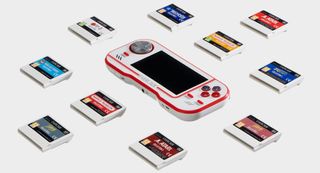
The games
Your age and the amount of nostalgia you can bring to the table will affect your mileage to an extent with much of the Evercade's titles. I started with gaming with a Commodore 64 and then went straight onto a Sega Mega Drive (Genesis) a few years later and the jump between the two was huge back then. As such, I've got much more of a fondness for the 16-bit games than the incredibly dated 8-bit titles.
That being said, the Mega Drive library has been released in collections on consoles for years now and the Genesis Mini had many of the same games and you won't find those games here, so, no, you're stuck with Double Dragon instead of Streets of Rage 2 - the latter being a game that still stands tall today. Likewise, the SNES Mini jealously guards all those Nintendo IPs.
However, there are plenty of classics here from a wide range of consoles including the NES, SNES, Genesis, and the Atari 2600/7800 days. We're talking Earthworm Jim, Splatterhouse 2, Alien Brigade, Titan, multiple Double Dragons, Burning Force (years ahead of its time technically, by the way), Phelios, Ninja Golf, Pac-Man, Centipede, Yar's Revenge, Galaga, Boogerman, and Two Crude Dudes. The names alone of some of those have made you curious, right?
If you really want to geek out on some niche material, you'll want to pick up the Piko Collection cartridge as this is where you'll find a bunch of games that never made it to western territories originally, and some of them were not even originally finished until recently.
Since we originally published this review in July 2020, even more game collections have been published, including a pair of Atari Lynx carts (a handheld console that was something of a rare sight even in it's heyday), a roundup of Oliver Twins games, and more.
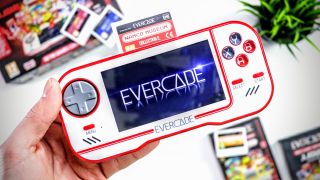
Who is the Evercade actually for?
The Evercade's biggest potential buyers are undeniably gamers who have fond memories of playing these games first time around. But with the games spread out across so many cartridges, they may find themselves having to buy some of them despite only really wanting to play one or two of their games. There's undeniably a lot of filler on some of them.
But if you've got a fondness for this era of gaming, or a desire to check out some gaming history, the Evercade is an absolute treat. Each cartridge box comes with a color manual with a page or two on each game with a bit of background and a controller map for the Evercade's layout (some of them are wrong/missing some moves though). Tellingly, there's a number on the spine of each box too, which might prove irresistible to some collectors wanting to complete a set. And expand it as, despite launching with ten carts, more are on the way soon. There are no digital extras such as extended articles or dev interviews which feels like a missed opportunity.
The fact that more games are coming makes the Evercade stand out from the other retro remake consoles out there, especially with scope for more deals to be struck with other past publishers or modern-day developers of less demanding retro-esque games.
The Evercade's biggest obstacle is that it's fighting the good fight against an almost endless swarm of (often free) retro arcade emulators that have all of these games, and more easily available on PC, mobile or tablet. There are lots of non-licensed retro handhelds available online too, many boasting 'thousands of games'.
The games on the Evercade here have been emulated to an excellent, professional standard though, so you're getting games that will run and not glitch out on you when you look at it funny, not to mention it's fully-licensed and 100% legal.
You might well be wondering, given the tiny data size of these games though, why spread them out across so many cartridges? Well, because, money. But as well as the need to make it financially viable in the long run and not just be a flash in the pan, the Evercade really wants you to buy into that old-school vibe allowing players to build up a physical collection of games. And this curated approach means that you will try every single game on the carts you do buy. If they put all 100+ titles inside it at once, you'd almost certainly not give half of them the time of day. Some of them are shit, though.
First reviewed in July 2020.
Brendan is GamesRadar's former Managing Editor of the Hardware & eCommerce team. He also spent time as the Deals Editor at our sister site, TechRadar. He's obsessed with finding the best tech, games, gadgets, and hardware at the lowest price. He also spends way too much of his free time trying to decide what new things to watch on Netflix, then just rewatches It's Always Sunny in Philadelphia instead. Nowadays you'll find him as the eCommerce Content Director for Future's mobile tech sites, Android Central, iMore, and Windows Central.
Buy more indie games, says Balatro developer, as the roguelike card game sails past 5 million copies sold: "There's some amazing stuff out there!"
The Witcher 3 director's new vampire open-world game sure sounds like it took a page from the D&D and Baldur's Gate playbook: "Sometimes it feels like playing a paper RPG"
Most Popular



